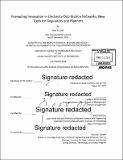Promoting innovation in electricity distribution networks : new tools for regulators and planners
Author(s)
Luke, Max N
DownloadFull printable version (9.498Mb)
Other Contributors
Technology and Policy Program.
Advisor
Ignacio Pérez-Arriaga and Richard Lester.
Terms of use
Metadata
Show full item recordAbstract
Recent years have seen an unprecedented increase in the adoption of distributed energy resources (DERs) in distribution networks around the world. In most jurisdictions the increase in DERs has been met with a "fit and forget" network management approach whereby grid planners accommodate these resources by expanding the capacity of the network with conventional technologies. However, the continued use of a "fit and forget" network management approach will lead to large inefficiencies compared to a network management approach in which DERs play an active role in the planning and operation of distribution networks. The transition to actively managed distribution networks, however, will require the development and deployment of a variety of new technologies and systems, and a sea change in the roles of electricity distribution utilities and in the ways in which utilities are regulated. The objective of this thesis is to equip regulators and network planners with a set of tools that, if adopted, will aid these organizations in transitioning from a passively managed to an actively managed network management paradigm. First, tools are presented for enabling network utilities to invest in the least-cost mix of conventional and unconventional network resources. These include regulatory tools for equalizing incentives for operational and capital expenditures, as well as a quantitative methodology that can aid planners in assessing the least-cost mix of conventional and unconventional investments. Second, regulatory tools are presented for enabling network utilities to adequately invest in specific outcomes that are not directly linked to economic efficiency but that will nonetheless be important for the transition to actively managed networks. Finally, regulatory tools are presented for encouraging distribution utilities to engage in long-term innovation - that is, investment in demonstration projects, as well as the technological learning that emerges from those projects and dissemination of knowledge and best practices between network utilities, technology providers, technology users, and other market participants.
Description
Thesis: S.M. in Technology and Policy, Massachusetts Institute of Technology, School of Engineering, Institute for Data, Systems, and Society, Technology and Policy Program, 2016. Cataloged from PDF version of thesis. Includes bibliographical references (pages 57-61).
Date issued
2016Department
Massachusetts Institute of Technology. Engineering Systems Division; Massachusetts Institute of Technology. Institute for Data, Systems, and Society; Technology and Policy ProgramPublisher
Massachusetts Institute of Technology
Keywords
Institute for Data, Systems, and Society., Engineering Systems Division., Technology and Policy Program.